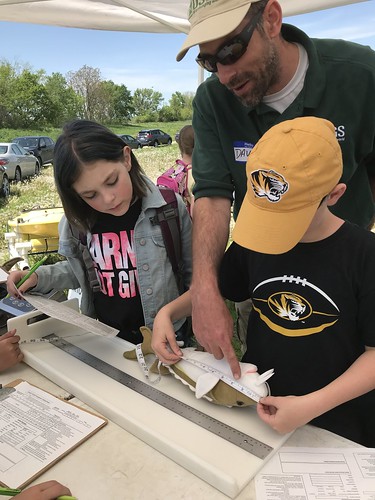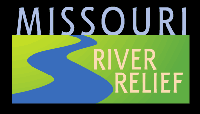If you’re not familiar, Missouri River All-Stars is an annual Missouri River Relief education program that works with 4th-grade students from Columbia Public Schools through a series of after-school programs and on the river field trip for students to further connect with the concepts covered. The program is designed to address various topics surrounding the Missouri River, such as history, ecology, and conservation efforts.
 |
| Students look at photos of the Missouri River and discuss how it has changed over time. |
Missouri River All-Stars After School Program greatly embodies these education tools, as lessons include things like preservation of the endangered Pallid Sturgeon and overall management of the river. While there have been studies published examining the effects these two educational philosophies on students, little research has been done looking at the impacts on educators. Tanner is studying pre-service teachers enrolled in two sections of a course offered for future educators at the University of Missouri titled “Teaching Science in Elementary Schools”.
 |
| Students explore the effects of damming on waterways as part of the All-Stars lesson plans. |
• Place-based socio-scientific issue (SSI) infused methods instruction affect elementary pre-service science teachers’ instructional values.
• In what ways does place-based SSI infused methods instruction affect elementary pre-service science teachers’ teacher preparedness? (both perceived and actual preparedness)
In his research, Missouri River All-Stars After School lessons are being given, as well as modified lessons to assess the effectiveness of including both socio-scientific issues and place-based education philosophies. This research is currently ongoing and examining teachers’ values and preparedness through surveys, peer interviews, assignments, and other check-ins throughout the study.
Other questions likely to be discussed based on his research:
• How do socio-scientific issues infused methods influence pre-service teachers’ conceptions about the processes, products, and solutions of science?
• How do in-service (teachers currently in the field) and pre-service teachers (teachers in training) compare in respect to the questions previously listed?
Student exploration of socio-scientific issues has been presented as a powerful strategy for supporting science learning and the development of scientific literacy. Further, it helps students develop their scientific thinking, argumentation skills, and moral reasoning.
 |
| Students working with a fisheries biologist during the All-Stars field trip to learn more about the Pallid Sturgeon. |
We’d like to thank Tanner, Dr. Ben Herman, Dr. Laura Zangori, and the University Of Missouri: College Of Education for exploring the impacts of programs like All-Stars on educators in the community. Thanks for letting Missouri River Relief be a part of this study. We’re excited to see how the research develops, and we’re looking forward to sharing it once it’s published!

No comments:
Post a Comment